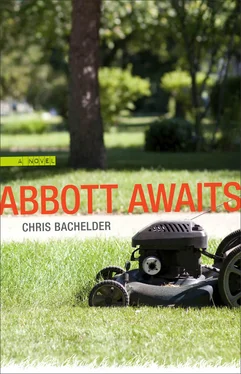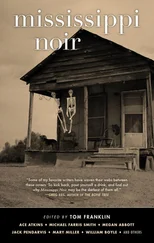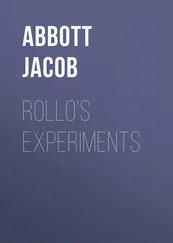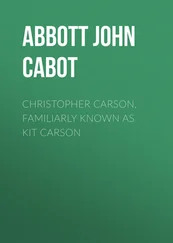13 Abbott Suffers the Pang of Vindication
Here in the corner of the basement, searching in and among cardboard boxes for a paint tray and rollers, Abbott finds the water. Six gallons, perhaps not hidden , but certainly stashed . His initial confusion gives way to satisfaction, which gives way to disturbance. This is not an argument one wishes to win. As long as Abbott’s wife is nonchalant about apocalypse, as long as her arguments derive from unexamined notions of hope and progress, as long as she does not surreptitiously buy emergency supplies, the household can exist in a delicate but sustainable balance. He’s the one who fears the cataclysmic demise of Western Civilization, not her. But now this dreadful evidence, this unwelcome glimpse inside her. How difficult to know someone, and how undesirable. Six gallons. Abbott walks across the basement to check on the three gallons he has hidden in the opposite corner. There they are, beneath a broken trampoline, looking insufficient. He wonders if she is twice as scared or just twice as diligent.
14 In Which Abbott Fails to Complete a Pretty Basic Task
When Abbott comes in from mowing, he finds his wife cutting his daughter’s hair in the middle of the kitchen. The girl is sitting in her highchair with a towel around her shoulders. She holds still; her face is grave, stoic. Abbott’s wife is biting her lip in concentration. She is using the family’s one pair of scissors, which is also used to cut paper, cardboard, fabric, wire, rubber, rope, dog-food bags, plastic packages of batteries, and once, in the middle of the night, aluminum. “I didn’t know you were going to do this,” Abbott says, wiping the sweat from his face and neck with a paper towel. Abbott’s wife mists the girl’s hair with a spray bottle Abbott has never seen before, not once. Abbott feels like an interloper. He tries to fade to the dark perimeter of the small kitchen, but there isn’t one. “When did you learn how to do that?” he says. Abbott’s wife leans down and closes one eye to check if the back of the girl’s hair is even. She’s so capable, so confident. So skilled and courageous with her dull scissors. “It’s not like I know how ,” she says. “I’m just doing it.” The ring of locks around the girl’s highchair looks to Abbott ceremonial or ritualistic. Abbott would no sooner cut his daughter’s hair than remove her appendix. He has never even considered that her hair would need to be cut, but of course her hair needs to be cut. What is the appropriate response to your daughter’s first haircut? Why is he sad and afraid? Abbott’s wife makes one more tiny snip and then circles the highchair, gently pulling strands of the girl’s hair. “There,” she says. “That looks great.” Abbott nods. It does look good. He emerges into the center of the room and puts his hand on the girl’s head. “No, Dad,” she says. “Would you mind sweeping up this hair?” his wife asks. Abbott slinks to the closet for the broom and the thing that you sweep things into. “Do you want to see?” Abbott’s wife says to their daughter, holding up a mirror. Abbott sweeps the hair into the thing and holds it. Golden ringlets is what they are. “What am I supposed to do with this?” he says. His wife says, “Just toss it.” Abbott walks to the trash can, opens the lid, and sees the coffee grounds, a leathery carrot, some wet noodles, and a diaper. He closes the lid. Abbott’s wife holds the mirror, brushes loose hair from the girl’s neck. “Well,” she says, “why don’t you take it outside and spread it to the winds?” Abbott says, “Really?” “It’s an organic substance,” his wife says. Abbott takes his daughter’s hair outside. He walks through the pachysandra and onto the lawn, smelling the cut grass and exhaust. The cat dashes across the yard, reminding Abbott that he has a cat. The birds are making a racket in the trees, and Abbott squints up into bright sun. Then he looks back down at the golden hair against the green plastic. He walks back through the pachysandra and into the house. His wife and daughter have moved to some other room. He can hear their voices. From a kitchen drawer he takes a sandwich bag. He pours in the hair, seals the bag, and places it behind a cookbook on top of the refrigerator, where it will remain either forever or until Abbott’s wife removes it.
Parenthood is a distant and peculiar country with its own customs and language. To people not living in Parenthood, the citizens of Parenthood may sound as if they have suffered an injury to a small but significant sector of the brain. “These are not the sensitive wipes!” Abbott’s wife shouts from their daughter’s bedroom. “And all these books in here really need to be washed.” “ Hey !” Abbott hollers. “Why did you erase Blue Robot?”
16 Abbott and the Wrong Tool
Abbott is embarrassed about his broom. It is not, he knows, the right tool for the job. Abbott in his adult years has accumulated a fair number of tools, almost all of which happen not to be the right tool for the job. Abbott saw his neighbors — months ago, at the first buds of spring — sweep the snowplowed rocks from their front lawns to the street with large indoor/outdoor push brooms. These things had rubber grips, hardy bristles, lifetime warranties. Abbott’s broom is a standard straw kitchen model, and it isn’t doing much to chase the gravel from the crabgrass. He imagines an assembly of Pilgrims watching him from the street and shaking their heads. Abbott knows he should purchase the correct broom but in doing so he feels that he will commit himself entirely to this house, this lawn, this neighborhood, this family, this economic status, this climate, this region and its unfamiliar cycles — the winter plows, the spring sweeps, the seasonal relocation of gravel. If he owns the broom, then he will be sweeping this weedy yard each year until his death. The improper broom is embarrassing, but it keeps Abbott’s options open. He can enjoy the freedom of the dabbler, though it is true that he is not enjoying his afternoon on the lawn. To brush the rocks from the grass and weeds, he must use an incredibly forceful raking motion, and soon his wrists and forearms are sore, and he is, he notices, developing blisters on his hands. There are gloves in the garage, but they are the wrong kind. Abbott takes a break. He cannot lean on his broom, and he does not smoke cigarettes. The tall banks of clouds to the east look like a kingdom moving in. Or to the west. A Japanese neighbor hangs wet clothes on the line. What happened this morning is that Abbott spoke loudly at his daughter. This loud speaking might in fact have been yelling. The girl was imploring — Abbott does not remember about what — and he spoke loudly at her. He said, “Stop it.” He exclaimed. “You just push and push and push ,” he said to her. “You will not let up.” Abbott knows that parents should not yell, that yelling just makes things worse and teaches children to yell. He knows he should maintain at all times a calm and controlled voice. He knows he should praise good behavior and simply ignore bad behavior until it disappears forever. Abbott can see that the broom is disintegrating. Pieces of straw are now mixed in with the gravel, and their extraction will require the use of some tool he does not own. It’s bad enough that he yelled at the child. What’s far worse is that his outburst to the two-year-old was nearly verbatim what Abbott had said several nights earlier, less loudly but more viciously, to his wife. He realized this as he said the words this morning, heard them, felt the familiar plosion of the push and push and push . There are different ways to articulate his misconduct, different angles of prosecution. It’s demeaning, Abbott suspects, to speak to your wife in the same way that you speak to your young daughter, while it might be downright creepy to speak to your young daughter in the same way that you speak to your wife. In either case, it means that Abbott has acted as if he is married to a toddler. But Abbott takes comfort in the suspicion that the problem is actually much more dire and generalized, not particular to his wife and daughter. He might, he thinks, yell these words at anyone, anything, in his small beseeching world. There is nothing that won’t not let up. Every day these cadgers and supplicants — the broken hinge, the moldy tub, the dog who has to pee. Down the street, coming closer, that sweaty college kid, collecting signatures for cleaner air.
Читать дальше












